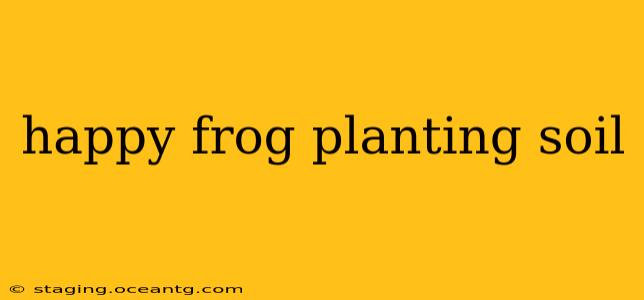Happy Frog Potting Soil is a popular choice for gardeners of all levels, known for its consistent quality and ability to support healthy plant growth. But what makes it so special? This comprehensive guide dives deep into Happy Frog's benefits, explores its ideal uses, and answers frequently asked questions to help you determine if it's the right soil for your gardening needs.
What is Happy Frog Potting Soil?
Happy Frog Potting Soil is a premium blend specifically formulated for container gardening. It's not just dirt; it's a carefully balanced mix of ingredients designed to provide optimal conditions for root development and overall plant health. Key components typically include:
- Peat moss: Retains moisture and provides excellent aeration.
- Coco coir: A sustainable alternative to peat, offering similar water retention and aeration properties.
- Worm castings: A natural fertilizer rich in nutrients that promotes strong root growth.
- Perlite: Improves drainage and prevents soil compaction.
Is Happy Frog Potting Mix Good for Vegetables?
Yes, Happy Frog Potting Mix is excellent for growing vegetables in containers. Its nutrient-rich composition provides the essential elements vegetables need for robust growth and healthy yields. However, remember that container gardening often requires more frequent fertilization than gardening in the ground, so supplementing with a balanced liquid fertilizer is recommended.
What Plants Does Happy Frog Soil Work Best For?
Happy Frog is versatile and works well for a wide range of plants, including:
- Vegetables: Tomatoes, peppers, cucumbers, herbs.
- Flowers: Annuals, perennials, and flowering shrubs in containers.
- Houseplants: Many houseplants thrive in Happy Frog's well-draining, nutrient-rich mix.
- Seed starting: The blend's light and airy texture is ideal for delicate seedlings.
Happy Frog vs. FoxFarm Ocean Forest: Which is Better?
The choice between Happy Frog and FoxFarm Ocean Forest depends on your specific needs and plant type. Both are high-quality potting mixes, but they have distinct characteristics:
- Happy Frog: A more balanced blend, suitable for a wider range of plants and generally requiring less frequent fertilization.
- FoxFarm Ocean Forest: Higher in nutrients, ideal for heavier feeders like tomatoes and flowering plants, but may require less frequent watering due to its higher organic matter content. It can also be too "hot" for delicate seedlings.
Ultimately, the "better" option is subjective and depends on your gardening style and plant preferences.
Does Happy Frog Potting Soil Need Fertilizer?
While Happy Frog contains nutrients, it's generally recommended to supplement with fertilizer, especially during periods of active growth. A balanced liquid fertilizer applied according to package directions will ensure your plants receive all the necessary nutrients for optimal health and production. The frequency of fertilization will depend on the plant type and its growth stage.
How Often Should I Water Plants in Happy Frog Soil?
Watering frequency depends on several factors, including plant type, pot size, temperature, and humidity. As a general guideline, allow the top inch or two of soil to dry out before watering thoroughly. Avoid overwatering, which can lead to root rot. Feel the soil to gauge its moisture level; if it feels dry to the touch, it's time to water.
Is Happy Frog Soil Good for Seed Starting?
Happy Frog is a suitable choice for seed starting. Its light and airy texture allows for good aeration, promoting healthy root development. However, some gardeners prefer a seed-starting mix that is even lighter and finer than Happy Frog, particularly for very small seeds.
Happy Frog Soil Review: What Do Users Say?
Online reviews generally praise Happy Frog for its consistency, ease of use, and ability to support healthy plant growth. Many users appreciate its readily available nutrients and its ability to retain moisture without becoming waterlogged. However, some users note that it can dry out more quickly than other potting mixes, requiring more frequent watering.
By understanding the composition, benefits, and applications of Happy Frog Potting Soil, you can make an informed decision about whether it's the right soil for your gardening endeavors. Remember that successful gardening involves more than just the soil; proper watering, fertilization, and sunlight are all crucial factors.
